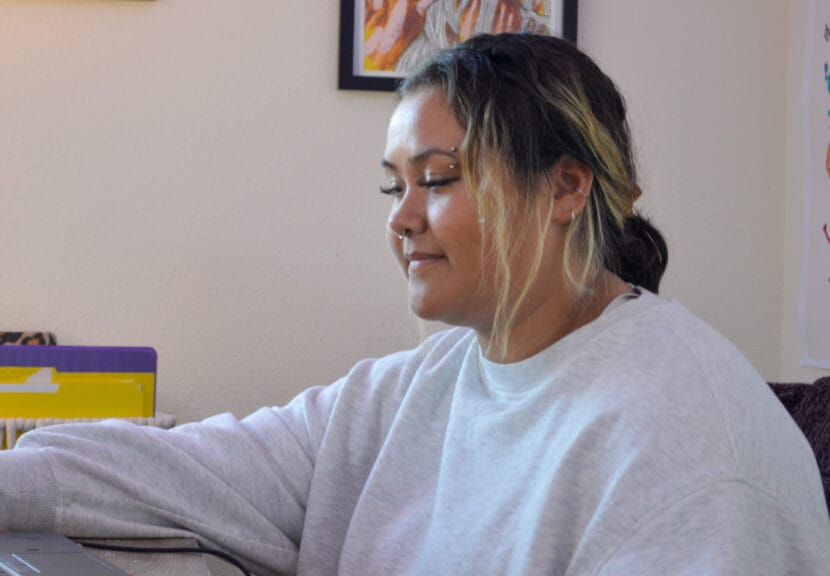
Kaia Quinto is the new executive director of Juneau Housing First Collaborative, also known as the Glory Hall. The Glory Hall provides shelter space for unhoused people in Juneau, and also owns 64 permanent supportive housing units — long term housing with financial assistance and health care access.
Quinto’s only 23, but she’s been working at the shelter for a couple of years, under the guidance of the former director, Mariya Lovishchuk. Lovishchuk is now the organization’s director of development. KTOO spoke with her about what she’s learned in her time working at the shelter so far and what’s to come for the organization.
Listen:
Yvonne Krumrey: As the executive director, what roles and responsibilities do you take on here?
Kaia Quinto: So my main responsibility is working with the board of directors and just making sure that the entire organization stays afloat, and running the shelter day-to-day.
Yvonne Krumrey: How did you first get involved in this organization?
Kaia Quinto: I applied three years ago at the suggestion of my dad, who was a downtown walking JPD officer, and he really got to know all the individuals at the Glory Hall when it was downtown, and had really good rapport with them. And so I got to know a lot of the patrons, just from through him, and also from working downtown during the summer. And yeah, I just, I just really knew that I wanted to be in some kind of social work field, and so I applied here in 2021 and now here I am.
Yvonne Krumrey: What have you learned in your three years working with the Glory Hall?
Kaia Quinto: So much, so much. Well, Mariya has just taught me, like, everything. I’ve learned so much from Mariya, and I’ve also learned, like, I’ve learned a lot of patience and compassion. I’ve also — well, to listen. I’ve become a very good listener.
Yvonne Krumrey: What are some of the challenges that the Glory Hall and housing first face?
Kaia Quinto: I think that one of the biggest challenges is just the general lack of affordable housing. I think it impacts us as an organization, and also our clients and our patrons. A person can have funding to get a home, but there’s just nothing available. So it’s really, it’s not like a “people can’t afford it” type of situation, there’s just nothing available.
Yvonne Krumrey: Yeah, and I know the recent apartments on Franklin Ave. have been a way to address that. Can I ask what helping with that project was like?
Kaia Quinto: It was, it was really exciting. I didn’t join it until the construction started, but I did help everybody move in, and it was — it’s really exciting to just see those seven apartments filled and people being at home.
Yvonne Krumrey: Is the Glory Hall working on any other projects, like the apartments on Franklin, now?
Kaia Quinto: We are building Phase Three of Forget-Me-Not Manor, which is going to add 20 more units, or 28 more units to Housing First. So that’s 28 more homes, which is really exciting.
Yvonne Krumrey: What have you learned from working with Mariya Lovishchuk in the time that she’s been here and you guys have worked together?
Kaia Quinto: I have learned so much. I didn’t know anything about permanent supportive housing. When I first started working here, I thought it was just like the Glory Hall, like a shelter for people experiencing homelessness. And I’ve learned how much collaboration is needed, like, between the Glory Hall and all the other organizations. And I’ve learned, yeah, I’ve learned a lot of how to be a professional from Mariya. Yeah, she’s just taught me everything.
Yvonne Krumrey: What are some things that the Glory Hall needs from the city or the community to move forward with the work that you do?
Kaia Quinto: I just would ask that you are compassionate towards our clients. And I would ask also that you just think about how much we do impact every single person’s lives.
